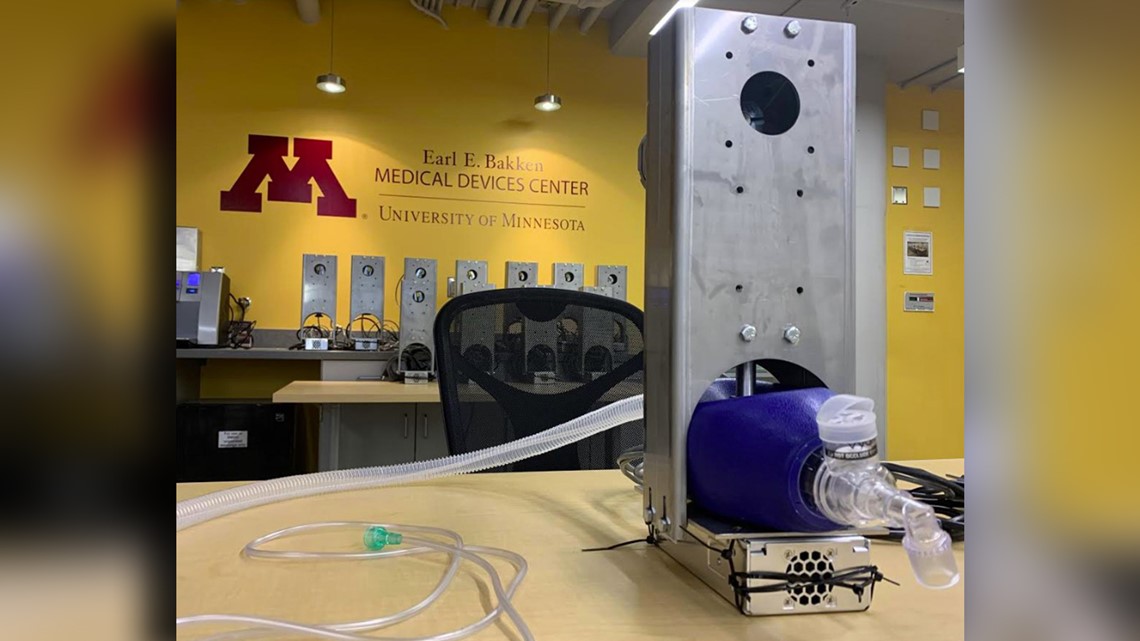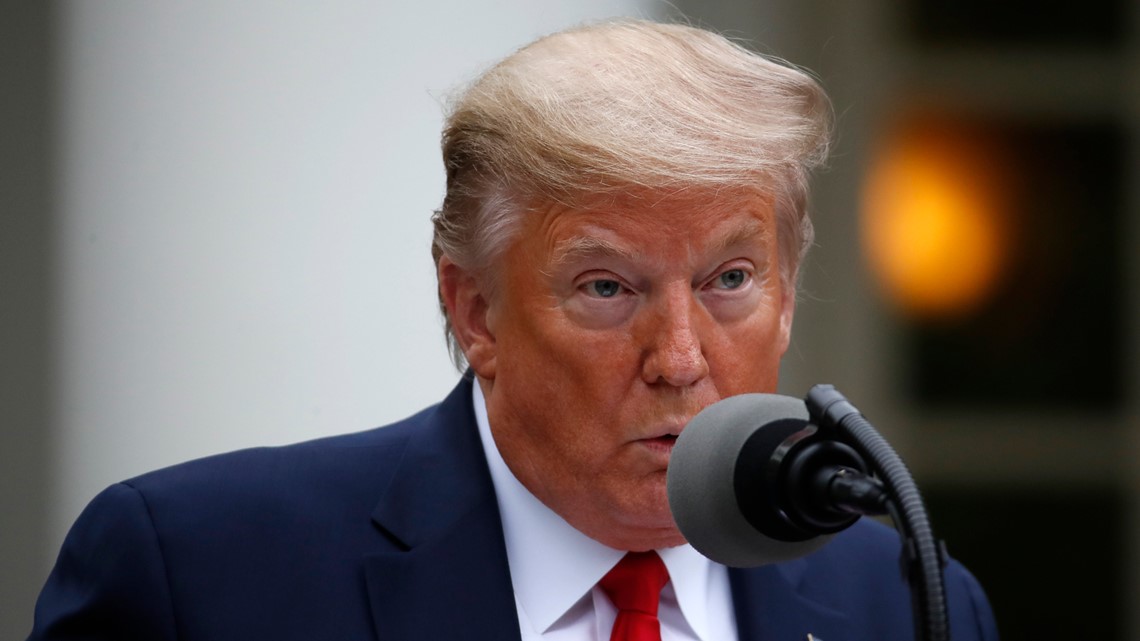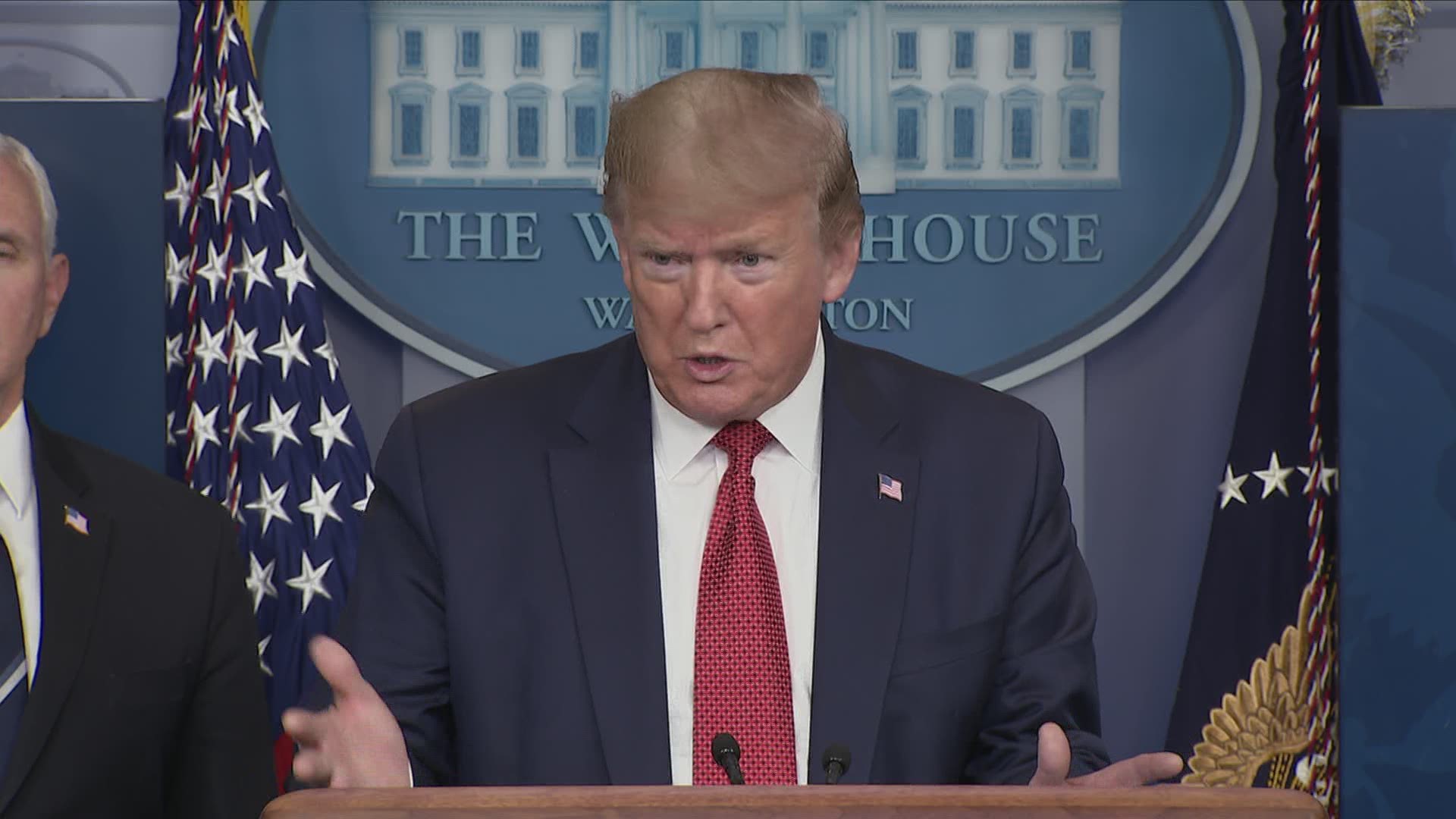WASHINGTON — This article contains ongoing U.S. and international updates on the COVID-19 pandemic and its effects. Here are some key updates for Thursday, April 16, 2020. You can find more details by scrolling through the story. To receive continued updates for Friday, April 17, click here.
- President Trump has told governors: “You're going to call your own shots.” The White House guidelines call for a phased reopening.
- Former Trump attorney Michael Cohen will be released from prison early.
- Italy will start immunity tests in early May.
- China is refuting claims that the new coronavirus originated in a lab near the city of Wuhan, where the pandemic began.
- The United Kingdom will be staying on lockdown for at least three more weeks
- L.A. Rams player tests positive for COVID-19.
- The FDA has approved a low-cost ventilator developed at the University of Minnesota.
- China's efforts to restart its economy are being thwarted by consumers who are not yet eager to spend money.
- From Wednesday's story: Chris Cuomo's wife also has coronavirus
The United States has more than 670,300 confirmed cases of COVID-19 as of Thursday around 10:45 p.m. EDT, according to Johns Hopkins University. There have been nearly 33,000 deaths and 55,900 recoveries in the U.S. More than 3.4 million tests have been conducted.
Worldwide, more than 2.1 million people have been confirmed to have the new coronavirus. There are over 144,000 deaths and 543,000 recoveries.
For most people, the coronavirus causes mild or moderate symptoms, such as fever and cough that clear up in two to three weeks. For some, especially older adults and people with existing health problems, it can cause more severe illness, including pneumonia, and death.
Michael Cohen being released from prison early
President Donald Trump’s former lawyer and longtime fixer Michael Cohen will be released from federal prison to serve the remainder of his sentence in home confinement amid the coronavirus pandemic, a person familiar with the matter told The Associated Press.
Cohen is currently locked up at FCI Otisville in New York after pleading guilty to numerous charges, including campaign finance fraud and lying to Congress. He will remain under quarantine for 14 days before he is released. Federal statistics show 14 inmates and seven staff members at the prison have tested positive for coronavirus.
After he is released, Cohen will serve the remainder of his sentence at home, according to the person, who could not discuss the matter publicly and spoke to the AP on condition of anonymity.
U.N. warns virus putting children 'in jeopardy'
United Nations Secretary-General Antonio Guterres is warning that the coronavirus pandemic is putting many of the world’s children “in jeopardy” and is urging families everywhere and leaders at all levels to “protect our children.”
The U.N. chief said in a video statement Thursday that the lives of children “are being totally upended” by COVID-19, with almost all students out of school, family stress levels rising as communities face lock-downs, and reduced household income expected to force poor families to cut back on essential health and food expenditures, “particularly affecting children.”
Guterres said “children have so far been largely spared from the most severe symptoms of the disease.”
But with a global recession gathering pace, he said, “there could be hundreds of thousands additional child deaths in 2020.”
That estimate came from a 2011 paper by three economists who investigated the impact of “income shocks” on infant mortality, the U.N. children’s agency UNICEF said.
The secretary-general launched a report on risks children face which said 188 countries have imposed countrywide school closures, affecting more than 1.5 billion children and young people. It also said nearly 369 million children in 143 countries who rely on school meals for daily nutrition must now look to other sources.
White House guidelines call for phased reopening
The Trump administration has issued new guidelines for states, individuals and employers on how to ease up on social distancing to deal with the coronavirus in areas where COVID-19 are on the decline.
The guidelines distributed to governors are published under the headline “Opening Up America Again.”
The guidelines say states or regions should meet certain criteria before moving to a phased opening. For example, there needs to be a downward trajectory of documented COVID-19 cases within a 14-day period and a robust testing program in place for at-risk health care workers.
For states and regions that satisfy the criteria for a “phase one” opening, the guidelines recommend that vulnerable individuals should continue to shelter in place. Others who go out should avoid socializing in groups of more than 10 people in places that don’t provide appropriate physical distancing. Trade shows are cited as an example.
For specific types of employers, it’s recommended that bars remain closed as part of phase one. However, theaters, sporting venues and churches can open “under strict physical distancing protocols.”
Trudeau: US border won't reopen soon to nonessential travel
Canadian Prime Minister Justin Trudeau says relaxing Canada-U.S. border restrictions is still a long way off.
Trudeau says it will still be a “significant amount of time” before Canada can loosen such a restriction. U.S. President Donald Trump says the U.S. and Canada are “doing well” amid the pandemic and says the U.S.-Canada border will be among the first borders to open.
The U.S. and Canada agreed last month to limit border crossings to essential travel amid the pandemic but that agreement is due to expire April 19.
Trump to governors: 'call your own shots' on reopening states
President Donald Trump has told the nation’s governors “you’re going to call your own shots” as he prepared to unveil national guidelines on when and how the country starts to recover economically from the coronavirus pandemic.
Trump is set to issue new guidelines aimed at clearing the way for an easing of restrictions in areas with low transmission of the coronavirus, while keeping them in place in harder-hit places. Ultimately, decisions on when to ease up will rest with governors.
Trump talked to governors before he unveils the guidelines to the public in the evening. The announcement comes on the same day the government said 5.2 million more Americans applied for unemployment benefits last week.
Trump said on Monday that his “authority is total” to reopen states but has since backed away from that claim after governors pointed out the Constitution does not grant the president that power.
Trump told the governors some of them are in good shape to open their states quickly, but others are in tough shape. He remarked that requests for ventilators have gone away, adding, “I say that respectfully.” He also asserted that “we’re in excellent shape” on testing, which many health care officials have disputed.
Midwest council of states announces plan to reopen economies
Seven Midwestern governors announced Thursday that they will coordinate on reopening their state economies, after similar pacts were made earlier this week in the Northeast and on the West Coast.
Thursday’s announcement covers Michigan, Ohio, Wisconsin, Minnesota, Illinois, Indiana and Kentucky.
The governors say they will work with experts and take a “fact-based, data-driven approach to reopening our economy in a way that protects families from the spread of COVID-19.”
Altogether, the 17 states covered by the three pacts are home to nearly half the U.S. population.
Italy to start immunity tests in early May
Italy will begin administering experimental coronavirus immunity tests on an initial 150,000 people nationwide in early May as part of its efforts to reopen after a weekslong shutdown.
Italy’s commissioner for the pandemic, Domenico Arcuri, told state-run RAI news Thursday that the government hopes the first wave of tests will progressively grow in number and become the national standard.
Italy, the European epicenter of the pandemic, has imposed a lockdown and production shutdown through May 3.
Individual regions and even companies are already gunning to start antibody tests to accelerate the reopening. But Arcuri made clear the government wants a unified approach in testing, which he said would be one of the “fundamental pillars” of moving into the next phase of the emergency.
Arcuri said another pillar involved rolling out a voluntary contact-tracing cellphone application, to provide real-time data on movements of people and possible new clusters of infection. A pilot program would begin in some regions and then extend nationwide, he said.
Russia allows controversial drug treatment Trump has been touting
The Russian government has allowed the controversial medication hydroxychloroquine to be used in the treatment of coronavirus infection.
The antimalarial drug has been touted, notably by President Donald Trump, as potentially effective against the virus, but clinical studies are inconclusive.
The drug is not registered for use in Russia, but a Chinese pharmaceutical company provided a large supply to the National Medical Research Center for Cardiology, according to an order from Prime Minister Mikhail Mishustin reported by Russian news agencies on Thursday. The order authorizes the center to provide the medication free to institutions treating coronavirus infections.
UK extends lockdown at least 3 more weeks
The British government says a nationwide lockdown imposed to slow the spread of the new coronavirus will remain in place for at least three more weeks.
Foreign Secretary Dominic Raab says “any change to our social distancing measures now would risk a significant increase in the spread of the virus.”
The lockdown has been in place since March 23. Schools, pubs, restaurants and most shops are closed, and most people are allowed to leave home only for essential errands or exercise.
Medical officials say the outbreak in the U.K. is reaching its peak but it’s too early to loosen restrictions on daily life.
As of Thursday, nearly 14,000 people had died in U.K. hospitals after testing positive for coronavirus.
Starbucks prepares to reopen stores
Starbucks is preparing to reopen certain stores and begin a return to normal operations. CEO Kevin Johnson outlined the company's "monitor and adapt" phase as the impact of COVID-19 lessens in various states.
"Some of you have asked if we will be able to re-open all our stores at once, and to be honest, there’s no one-size-fits-all solution," Rossann Williams, evp and president, U.S. company-operated business and Canada wrote in a letter to Starbucks partners.
Johnson outlined in a separate letter that some stores would continue drive-thru orders, others may move to in-store pick up and some may reopen the dining areas.
Employees who do not feel safe going to work will no longer be eligible for catastrophe leave after May 3, and will have to use vacation or sick days. Williams said the company will be phasing out catastrophe pay for employees by June.
China denies allegations about origin of virus
China is refuting allegations that the coronavirus pandemic may have originated in a laboratory near the city of Wuhan where contagious samples were being stored.
Foreign Ministry spokesman Zhao Lijian cited the head of the World Health Organization and other unidentified medical experts as saying there was no evidence that transmission began from the lab and there was “no scientific basis” for such claims.
China has also strongly denied claims it delayed reporting on the virus outbreak in Wuhan late last year and underreported case numbers, worsening the impact on the U.S. and other countries. The virus is widely believed to have originated with bats and have passed via another animal species to humans at a wildlife and seafood market in Wuhan, although a firm determination has yet to be made.
Allegations about a leak of the virus from the lab have been made in the U.S. media without direct evidence, and President Donald Trump has vowed to suspend funding for the World Health Organization, partly because of what he claims is its pro-China bias.
British veteran, 99, walks 100 laps to raise millions
A 99-year-old military veteran has completed his quest to walk 100 laps of his garden to raise funds for the National Health Service.
Capt. Tom Moore raised some 13 million pounds ($16 million) to support health care workers during the coronavirus pandemic.
As he reached his goal, he shuffled through a guard of honor from the 1st Battalion of the Yorkshire Regiment and said he was glad to be “surrounded by the right sort of people.”
Moore, who uses a walker, sought to walk 100 laps in his 25-meter (82-foot) garden before he turned 100 on April 30. But his simple act captivated the nation in a time of crisis.
Rams center first NFL player to reveal he has COVID-19
Los Angeles Rams center Brian Allen says he tested positive for COVID-19 three weeks ago.
Allen is the first active NFL player to acknowledge testing positive during the coronavirus pandemic.
The third-year pro is not hospitalized and is “feeling good,” according to a statement issued by the Rams on Wednesday night only after Allen spoke to Fox Sports about his positive test.
Allen became the team's starting center last season. He played in nine games before missing the rest of the year with a knee injury.
FDA approves low-cost ventilator
The U.S. Food and Drug Administration has approved a low-cost ventilator developed by the University of Minnesota and aimed at helping COVID-19 patients breathe.
The FDA authorized use of the compact device, known as the Coventor, that was quickly developed and designed by a team of university researchers, a medical school resident and an engineer.
The developers hope the Coventor will be used in clinical settings where traditional ventilators are unavailable.


China tries to revive economy but consumer engine sputters
Chinese leaders have reopened factories and shops in an effort to revive the economy, but the consumers whose spending propels most of China's growth have been slow to return to shopping malls and auto dealerships.
Authorities are trying to encourage spending by handing out shopping vouchers, but many people are uneasy about a possible resurgence of the coronavirus or losing their jobs.
The delay is a blow to automakers and other global companies that hope China will power a worldwide recovery following the most painful peacetime downturn since the Great Depression of the 1930s.
New Mexico joins US pilot program on contact tracing
New Mexico's governor says the state has accepted an invitation from the White House to participate in a pilot program to improve and expand contact tracing for coronavirus infections in efforts to better isolate outbreaks.
Democratic Gov. Michelle Lujan Grisham said the she accepted an invitation to participate in the pilot program during a conversation Wednesday with the White House, and that it was unclear whether other states would be involved.
New Mexico has consistently been among the top states in testing per capita for COVID-19 infections, while aggressively tracing new infections and developing a customized forecast model in cooperation with two national laboratories in the state.



